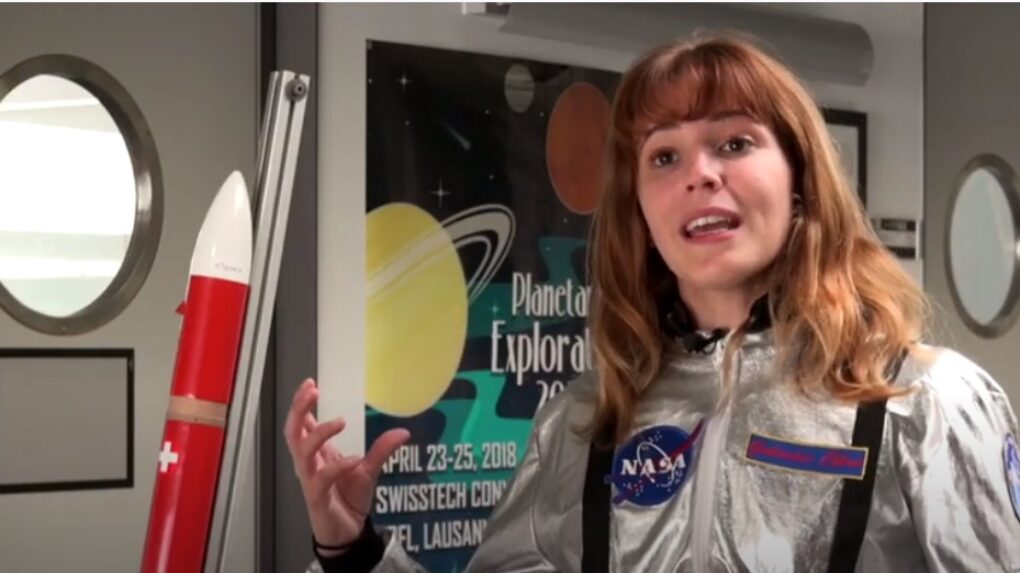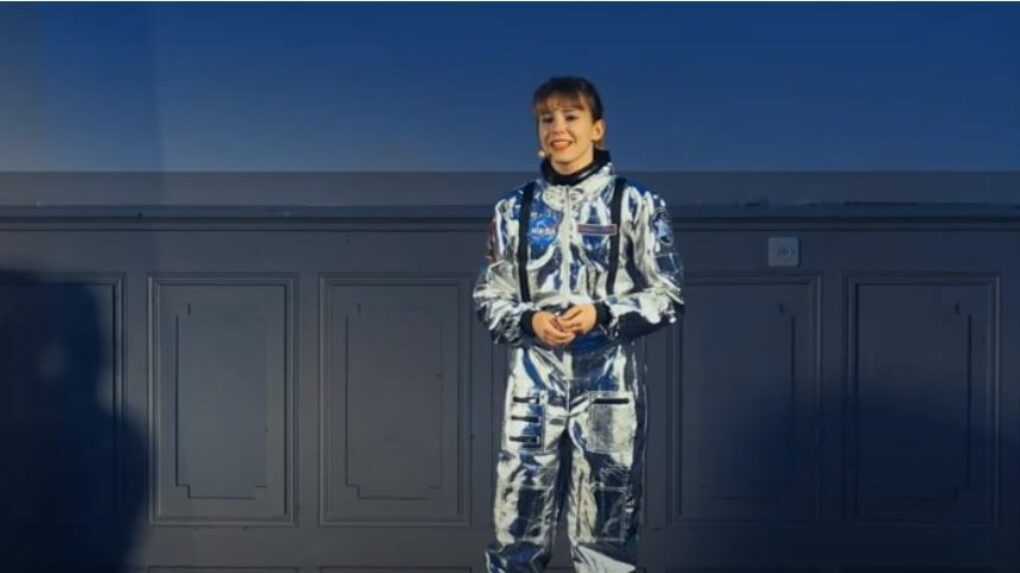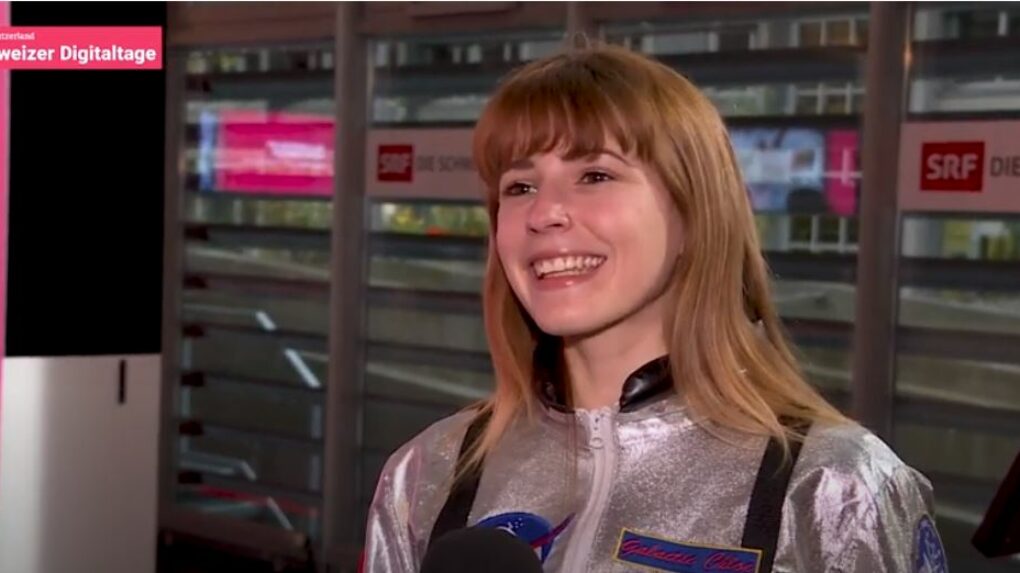-
über uns
Swissnex
The Swiss global network for education, research and innovation
-
Entdecken
Swissnex
The Swiss global network for education, research and innovation
-
Unsere Arbeit
Swissnex
The Swiss global network for education, research and innovation
-
Unser Beitrag
Swissnex
The Swiss global network for education, research and innovation
- Globale Reichweite
-
Swissnex
The Swiss global network for education, research and innovation

When Galactic Chloé - Swiss student Chloé Carrière - isn't studying from home (and transforming her balcony into a lab for space applications), she is busy bringing science communication about astronomy, astrophysics, cosmology, space missions and space engineering to the public.
She is the creator of Space@yourService, which organizes Astronomy on Tap events in Lausanne and just launched Asclepios, an analog space mission on another celestial star. Chloé is also hosting the Galactic Chloé Show on Youtube, and recently won the Digital Economy Award a the Swiss DigitalDays. She spent the summer of 2019 at Swissnex in San Francisco.

Chloé Carrière aka "Galactic Chloé"
Chloé, it's great to reconnect! What have you been up to since you got back from your stay at Swissnex in San Francisco?
November 25, 2020I recently wrapped up my Bachelor's degree in physics and am now pursuing my Master's degree in Management of technologies & entrepreneurship, as well as a Minor in Space Technologies. I am also the Founder and President of Space@yourService, a non-profit that I launched about two years ago with many exciting projects going on - one of them being a mission to inspire people about space and science in general. And if there is time left, I am doing a lot of pole dancing!
Sounds like you have been busy! How has the pandemic affected your work-life so far?
Oh right, and there is Covid-19. Well, the motivation is still there - and it always will be! You don't have a choice anyways, because the consequence would simply be for all those amazing projects to stop. I am currently stuck in Switzerland, and my parents are "locked down" in France. This was a really tough choice for me to make, since I am super close with my family. However, I also get A LOT done while we all were confined at home. I transformed my balcony into a space lab!
Exciting! Can you tell us a little more about those projects?
What keeps me busy these days is the big "Asclepios mission". It's the lunar analogue mission I launched when I got back from my stay at Swissnex in San Francisco in 2019. And it's a big one: 60 international students are involved, about half of them are based in Switzerland. We were hoping to do our 10-day mission last April, but then COVID-19 struck. So we had to postpone everything twice already, which definitely took a mental toll on all of us. The hardest part is just not knowing when we can do it: we're all students and hope to find real jobs at some point - we're running out of time. But that's how it is, and it's ok.
You mentioned 50% of involved students are abroad. How did the pandemic change the international dimension of the space analogue mission?
Well, the preparation and pre-work stuff would have happened virtually anyways - but we never anticipated so many international students participating. Now things are changing hopefully, as we're ready to put everything on the ground!
Sounds like a positive effect of the pandemic?
All of us had to learn how to work remotely, and so we had the opportunity to make the project even more inclusive. We created all the tools and applications we needed to move forward with the project. What was really hard though - and still is - is coordination across multiple time zones!
Oh yes, we know what that feels like! So where's your mind right now as we wrap up a truly unique year? Did your views on Earth and Space fundamentally change due to the pandemic?
It's really difficult and we're all living in a different reality. Nobody could have pictured something like this to happen a couple of months ago. Last week, I went out and I forgot my facemask and I thought, wow, this is going to be a thing to never forget - like your ID and your bag. For the things I'm working on, I am feeling like the more time this takes, the harder it is for people to focus, to dream, and to see anything else besides the panemic. And this is when I think that it's our job as scientists to show people something else than COVID-19 - because there is! It's a pivotal moment right now as some people would argue that we should focus even more on anything that's happening on Earth. It's like, why should we care about the Moon? Again, I think it's important for everyone to keep dreaming and keep focusing on things that inspire them, now more than ever!
Is there any other major project that you're working on right now?
There is, and maybe you've heard of it already: it's the Galactic Chloé Show, co-founded by EPFL! Actually, the first time I talked about this with their Head of Communications, Mirko, was right when I came back from Swissnex in San Francisco - we got in touch because one of your CEOs made the introduction. It turned out they wanted to develop new ways of commnicating with people anyways, and were also hoping to involve staff and students to do so. Then COVID-19 happened. Once more a perfect opportunity to launch a scientific show like this one - with a clear focus on people, their stories and the things that happen "behind" the scenes and the science. We're producing an episode every three weeks.
-
![]()
The Galactic Chloé Show
Who has been supporting you? Do you have somebody like a Mentor?
Yes! And I'd divide them into three groups: The first one are the people from the Swiss Space Center and from the EPFL Space Center - especially their Directors have been extremely supportive, Jean-Paul Kneib, a well renowned Physicist and Volker Gass the Swiss Space Center Director. When I got into Science Communication, I just knocked on their doors, basically pitching something I had in mind - like, "I neither have the money nor the tools to do this, but I have the idea and people who are supporting it". And as we launched more and more initiatives, we decided to found this Non-Profit organization. The second groupe are some of our "space VIPs" - especially Claude Nicollier means a lot to me: he's not just this other professor, but a role model and super inspiring. Whenever I talk to him, he makes you feel like someone extraordinary - and he is an astronaut! It is crazy when you think about it! Lastly, I am super close with my family and my parents have been supporting me whenever I needed them. They are great listeners and are always around when I need them - even virtually.
Tell me more about your "Science Behind Moonwalking" Talk: was this basically the predecessor of your Galactic Chloé Show?
That is a nice story - because I not olny created this Non-Profit, but also participated in various challenges and competitions about science communication. Basically you had to explain a scientific aspect in three minutes in front of a large audience. And I just signed up for it, without having done anything like this before - and my pitch was about "how to leave the Earth gravity". It went really well but also made me feel uncomfortable: I was basicaly surrounded by all those super smart PhDs from MIT and I was like - what am I doing here?! In the end I won the National Audience Prize, so that was very cool. So I kept doing it I think a couple of times on other stages and again at Swissnex in San Francisco. It was a fantastic learning opportunity and a fun engaging format: the "Science Behind Moonwalking" Talk was born! I haven't done it in a year though - because with the space analogue mission we're not only talking about how we could go to the Moon anymore; we're actually working on it by settnig up this village on the Moon.
-
![]()
Swiss Famelab finals 2019: Chloé Carrière - The science behind moonwalking
Cool. It sounds like there is something to this format: to make things a little more exciting, more engaging and also a bit unexpected.
Yeah, and also I think: the shorter it is, the better! It's hard to make science simple, I get it. But if you're successful, you'll reach more people and the more efficient you can do Science Communication!
So why is it important to you to talk about science at all? Why do you care so much about it?
The defining moment for me was doing a science internship for Clean Space One - and I felt like there was a big demand for more engaging science communication: most universities simply open their doors once a year, and that's about it. And pleace don't get me wrong here, this is not a negative thing at all. But bringing people to the science is not exactly the meaning of science communications. It's more about bringing the science to the people, because someone who is not interested in science at all will never go to an open day on campus. This is when I had the idea of creating a space-themed escape room, trying to engage a much broader audience. Have you ever participated in an escape room? If so I am sure that you still remember most of the story! It just works - and it did! For me, without lying, I think in the US they're way better in science communication than we are in Europe: They are much more at ease in speaking with other people. They have this charisma and there's this whole character and really you can feel what they want to share. This is less the case in Europe. Maybe the Americans tend to oversell - there should be something in the middle, probably.
-
![]()
Digital Days 2020 - Galactic Chloé is one of the winners of the Digital Economy Award
Talk a little bit more about your experience in the USA and at Swissnex in San Francisco
I was there during the summer period for seven weeks, and I met some amazing people at Google or NASA, and they wanted also to organize more events and in collaboration with Switzerland. The one thing that I did not expect was for people to be so open minded! They really wanted to help you out - and made the big escape room possible! It's definitely a place where you can really innovate, because you are in the mood to innovate. I even got to speak on stage with Eugene Tu, NASA Ames Director, this was huge for me! Talking about the American way of networking and innovating: no matter what your title is, your age or anything else, everybody is accessible, and you get your opportunity to pitch and convince them of your idea.
It's like you get your shot - and if you're good at something, they're going to listen to you or keep listening to you.
Exactly. and this is something that changed in my way of working. When I came back to Switzerland, I just reached out to EPFL's Head of Communications, Mirko Bischofberger - I would have never done this before! Think about it, we're talking about EPFL! And now we're doing a show together.
What is your very personal Swissnex experience?
You guys are connecting Switzerland with the world in research, education and innovation. But you are also much more than that: you've become something like a big family to me. It was hard to leave, and I felt like I really connected with lots of people. Swissnex was a fundamental and logical step in my journey, let's say: The Galactic Chloé Show probably would never have happened without the team there. I probably couldn't have had developed the escape room. By the way we're trying to convert it into a digital experience now with the Swissnex Science and Technology Office in Japan - the journey is continuing! On top of that, one of my recent projects - Asclepios - which keeps me very busy right now, would never have happened without Swissnex. I was able to discuss it with amazing people at NASA Ames, and I also got introduced to Angelo Vermeulen, a space systems researcher now based in the Netherlands. He very much liked the idea and ever since we actually launched the intiative we regularly keep in touch.
We just turned 20 - and it's time to look ahead and think about the future of Swissnex specifically and Switzerland's ERI in general. Can you give us any advice?
Oh wow, that's a tricky one! I mean, this is not my place to decide what should be the next challenges. But I will probably help shape it, in a way or another. My experience as a student has been outstanding. However, for me personally, I always tried to do a little more than just studying. I felt like all the projects that I have been doing on the side were at least as relevant to me as my actual education. And this is what I am trying to communicate to everybody I talk to, especially kids: think big, and act big! But also make sure to work on relevant stuff, explore, try, fail, and continue. That's how we're going to make the world a better place.


